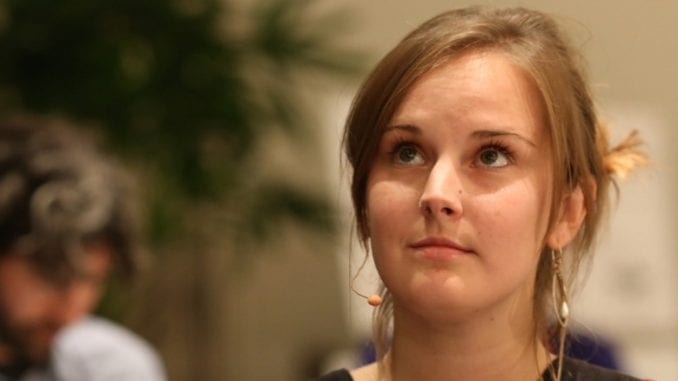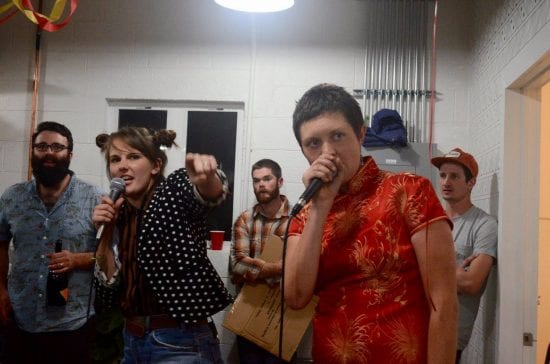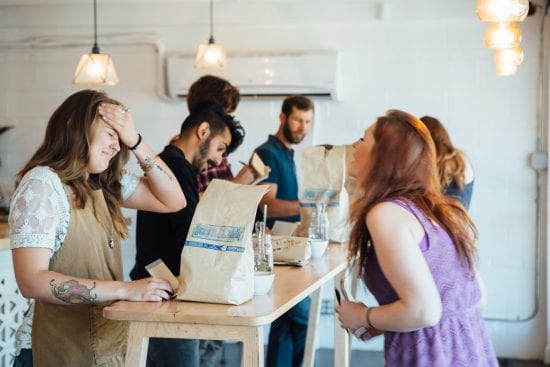
Elle Taylor is the owner of Amethyst Coffee in Denver, and you’d be hard-pressed to find a better, more inspiring leader who is as candid with her thoughts, mistakes, and goals. Here’s part one of her incredibly intimate interview with us.
BY ASHLEY RODRIGUEZ
BARISTA MAGAZINE ONLINE
Photos courtesy of Elle Taylor
Ashley Rodriguez: What were you doing before you started making coffee? What career path did you imagine yourself on?
Elle Taylor: I was working in bars and restaurants while in college. I was in school to be a music therapist, and then I realized that the amount of self-care, self-actualization, and time one needs to dedicate to dealing with their own demons to be able to deal with someone else’s demons was too much for 21-year-old me. I changed my major and graduated with a degree in songwriting, which was absolutely the right choice. My degree taught me something that was a detrimental hardship at the time, but now I value more highly than anything. Any class I walked into there was criticism that was always meant to be constructive. Whether it was my singing (voice was my principal instrument), my appearance, my playing, my song choice, my phrasing, my breathing, my posture, or the way in which I communicated with my accompanist/band, everything was criticized in front of your peers/classmates.
There were workshops, labs, ensembles, writing groups—you name it, we had to do it. For someone who has always been shy about their musicality but loved it with a fiery passion, this was incredibly hard for me. However, after going through that I realized that it really thickened up my skin and made me super open to criticism. It also makes me approach people in a way that is not often received very well. I tend to present ideas and opinions very openly, and have no problem being told that I’m wrong or that I need to rethink things. However, I tend to talk about things with a lot of intensity and that, combined with my generally stubborn nature, often presents itself as close-mindedness.
I didn’t realize what a self-actualized, self-caring, and demon-fighting individual one needs to be to follow the career path that I eventually chose. That was a pretty big wake-up call.

AR: How did you get into coffee? What was your first coffee job?
ET: Technically my first coffee job was at Saint’s Cafe in State College, Pa. However, I did not work there for very long, nor did I take it seriously enough. I consider my first real coffee job to be at a cafe in Boston called Pavement, which was (and is) a Counter Culture Coffee account. It was the Boylston location, if you happen to be familiar. I was working in bars and restaurants, but 2 a.m. is not my preferred time for an hourlong bike ride home, so I decided that between school and rehearsal, coffee would be the better bet. Pavement was right around the corner from my college, so I applied for a job and got it. Later my first manager told me that he gave me an interview solely because my email address started with ‘ellesbelles.’
There’s a tip for you: Don’t change your middle-school email address because it might land you the gig that guides the rest of your life.
AR: What brought you over to Denver? Why did you decide to anchor your business there?
ET: After I graduated college I really needed to leave the East Coast. I grew up there, went to school there, all of my friends and people were there, but I needed a change more than I even knew I needed it. A dear, dear friend of mine was moving to Denver to manage some cafes and jokingly one day said he was ‘nervous’ about hiring in a city that he didn’t know. I decided to take the opportunity to weasel my way into a job, and to Denver I went, sight unseen.
When it came time to think about working on something myself, it wasn’t so much a decision as a perfect storm. I was fed up with managing and was at the all-too-familiar crossroads of either betting everything I had on coffee or folding and keeping it as a fond memory of a life I once lived. I bet it all on Amethyst. I only looked at one location, and in a matter of six months I had quit my job, signed a lease, wrote a business plan, figured out money, designed, built, and opened a cafe (not at all in that order). There were definitely a few months when I thought ‘what in the actual f*&k did I do?’ but that sentiment has since abated.

AR: Opening a business by yourself is hard, obviously. How did you do it? How would you advise others who want to do the same?
ET: Don’t do it alone. Seriously. Truly. Don’t. Maybe it works for some people, but it really doesn’t work that well for me. I get heart-wrenchingly lonely, I feel overwhelmed and stressed out by the smallest of decisions, I’m always frazzled, late, and disorganized. I really kind of hate it. I might eat those words one day because I am constantly convinced that I know best (an embarrassing but very real fault of mine), but I feel that way so much after two years. Having total control is not all it’s cracked up to be. Find someone whose skills and passions complement yours, and have a lawyer write up a bunch of paperwork with verbiage that makes you uncomfortable, and THEN open a business with said person. We want prenup!
AR: What did you want to achieve in your business that you weren’t seeing in other cafes?
ET: I needed to be all-in or get out, so I chose all-in. Looking back there were other roads I could have taken, but I don’t regret anything, and I certainly don’t regret Amethyst. At any given moment, even when I royally screw up, I’m living my human experience, and that’s about all I can ask for. My biggest motivation behind Amethyst was creating a company that looked like any other coffee company, as Amethyst does, but is really very barista- and service-centric.
Let me break it down. There’s a common theme in the service industry of promoting the ‘best’ people with a flagrant disregard for whether or not they would be an effective manager, because that’s really the only way up the ladder. The farther up the ladder you climb, the more hours you work, the less you get paid, and the less you get to actually do the fun part, which for me is working with the product and engaging with people. I thought that could change, and now I know it can. I LOVE being a barista. I love being behind the bar. I love meeting all sorts of people, especially the people who don’t like Amethyst because they are the ones who make me better. They are the ones who make me step back and really think about why they didn’t like their experience or why they don’t want what I have chosen so intentionally to offer. I wanted to create a company that would foster that kind of passion for being a barista. I don’t ask people for more than they physically have to give (but I definitely test the boundaries of what they have to give emotionally), I give people the time off that they want, everyone has a set schedule, and I give them the freedom to be themselves as wholly as they want behind the bar, as long as they treat everyone with respect.
I wanted to provide people not just a workplace, but a company they could see themselves growing with. To do that, I knew I would have to offer more, so I’m figuring out day by day how to do that. Right now, it means we do everything in-house. Our social media, our tech work, our merchandise, and our managerial duties are all handled by our baristas. I have passions other than coffee and I know other people do, too. It also means that money goes back to my staff and doesn’t get contracted out to someone else. I don’t want Amethyst to take over anyone’s life in a detrimental way; I want Amethyst to creep in like that person who has been your best friend for years and then one day you wake up and BAM! You realize you’re in love.
There are also specific plans for growth on the horizon that I think set Amethyst apart, but that we will save for another day.

